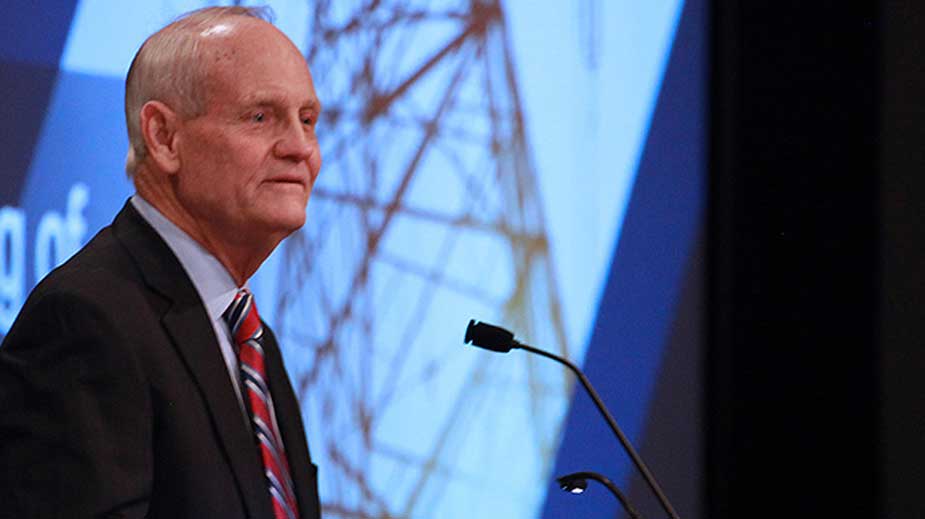FirstEnergy CEO Calls $60M Bribery Scandal ‘Disturbing and Serious Situation’
YOUNGSTOWN, Ohio – FirstEnergy Corp. CEO Charles Jones said Friday that the company has “acted properly” in the aftermath of a federal investigation that has placed the utility at the core of a $60 million bribery scheme.
He also affirmed that FirstEnergy, its subsidiary FirstEnergy Services, and the company’s political action committee were served subpoenas on Tuesday related to the investigation.
“We are having discussions with the Department of Justice lawyers and will comply fully with the subpoenas,” he said during a previously scheduled conference call with analysts. “I believe that FirstEnergy acted properly in this matter and we intend to cooperate fully with the investigation.”
On Tuesday, federal authorities arrested Ohio Speaker of the House Larry Householder and four others on a criminal complaint alleging they perpetrated a scheme that funneled more than $60 million of FirstEnergy money into a Householder-controlled dark money group called Generation Now. The funds from Generation Now were used to bribe officials, “line the pockets” of those involved, secure support for Householder’s election as speaker, and support the passage of House Bill 6, authorities allege.
H.B. 6, signed into law last year, allows for ratepayers to subsidize two aging nuclear power plants owned by FirstEnergy Solutions, a former subsidiary of FirstEnergy.
FirstEnergy Solutions is now Energy Harbor.
The bailout was valued at more than $1 billion.
“This is a serious and disturbing situation,” Jones said of the arrests and investigation. “Ethical behavior and upholding the highest standards of conduct are foundational values for the entire FirstEnergy family and me personally.”
FirstEnergy has not been charged in the complaint, nor were any of the company’s employees.
However, Jones said that about 25% of the money referenced in the complaint that went to Generation Now came from FirstEnergy Corp. Generation Now is registered as a 501(c)(4) organization, which is able to engage in lobbying and political activity. These groups are not bound to disclose the identities of donors who contribute to them.
The CEO could not comment on contributions made from other entities, including former subsidiaries.
“Let me be clear, at no time did our support for Ohio’s nuclear plants interfere with or supersede our ethical obligations to conduct our business properly,” Jones added. “The facts will become clear as the investigation progresses.”
Jones emphasized that the CEO in the complaint whom authorities allege made a direct payment to a lobbyist is not him.
“I’ve never made a payment directly to a lobbyist in my life, nor asked any lobbyist to make a payment to anyone else on behalf of our company in my life,” he said.
Jones added that the company plans to perform an internal review to respond to the complaint.
Most of the question and answer session focused on the investigation, causing Jones at one point to interject: “It would be really nice if we could actually talk about the great quarter we just had.”
FirstEnergy finished the three months ended June 30 with a net income of $309 million, compared to $308 million during the same period in 2019.
The company, however, likely will face a slew of shareholder litigation in the wake of the investigation.
It didn’t take long for law firms from across the country to pounce in the wake of Householder’s arrest. Within hours of the arrest, a flurry of press releases from securities litigation firms began to hit news wires announcing their own probes into FirstEnergy on behalf of the utility giant’s shareholders.
FirstEnergy’s stock value cratered more than 40% the day following Householder’s arrest. The utility’s stock closed at $41.26 July 20. By 10:30 a.m. July 22, share prices collapsed to $24.46. At the close of trading Friday, FirstEnergy stock was trading at $29.48 per share.
Kaplan Fox & Kilsheimer LLP, New York, announced July 21 it would initiate an investigation on behalf of shareholders who purchased FirstEnergy or Energy Harbor securities. Energy Harbor is a former subsidiary of FirstEnergy.
On Wednesday, Milwaukee-based Ademi & O’Reilly LLP said it, too, was investigating possible securities fraud claims against the utility.
At least nine other law firms from New York, Boston, Los Angeles, Philadelphia and San Francisco have publicly announced they are launching investigations related to FirstEnergy.
Were the company to experience a bond ratings downgrade from Standard & Poor’s because of the investigation, Jones said that FirstEnergy would not revise its business plan in the short term.
“If they were to downgrade as a result of this news, it’s our job to get this news behind us and when it happens I would expect them to restore the rating that’s appropriate,” he said.
Jones reinforced that the underlying financial condition of the company is healthy. “Our balance sheet is getting stronger,” he said.
Copyright 2024 The Business Journal, Youngstown, Ohio.


